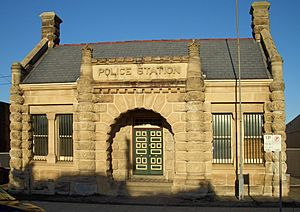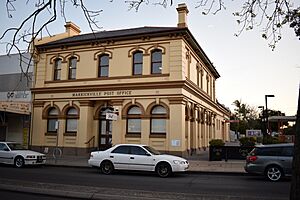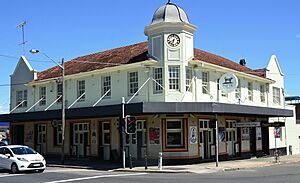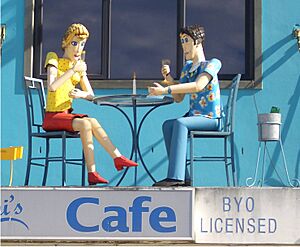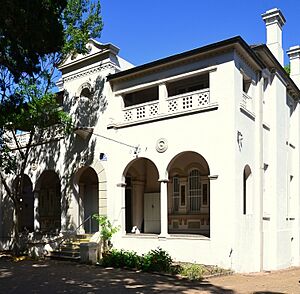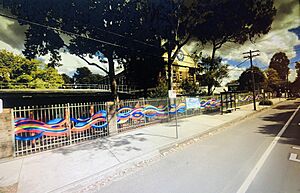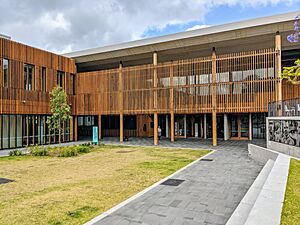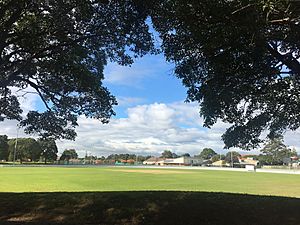Marrickville, New South Wales facts for kids
Quick facts for kids MarrickvilleSydney, New South Wales |
|||||||||||||||
|---|---|---|---|---|---|---|---|---|---|---|---|---|---|---|---|
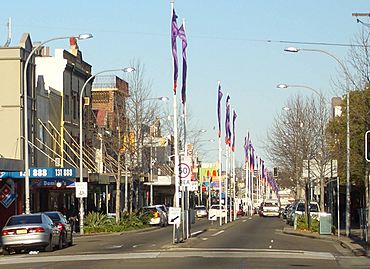
Marrickville Road
|
|||||||||||||||
| Postcode(s) | 2204 | ||||||||||||||
| Elevation | 17 m (56 ft) | ||||||||||||||
| Area | 5.8 km2 (2.2 sq mi) | ||||||||||||||
| Location | 7 km (4 mi) south-west of Sydney CBD | ||||||||||||||
| LGA(s) | Inner West Council | ||||||||||||||
| State electorate(s) |
|
||||||||||||||
| Federal Division(s) | |||||||||||||||
|
|||||||||||||||
Marrickville is a suburb in the Inner West area of Sydney, New South Wales, Australia. It is located about 7 kilometers (4 miles) south-west of Sydney's city center. Marrickville is the largest suburb in the Inner West Council area.
Marrickville is on the northern side of the Cooks River. It shares borders with several other suburbs like Stanmore, Enmore, Newtown, and Dulwich Hill. The southern part of the suburb, close to the river, is known as Marrickville South.
Marrickville is a very diverse suburb. It has many different types of homes, shops, and light industrial areas.
Contents
History of Marrickville
First Peoples' History
The Gadigal or Cadigal people, part of the Eora Nation, have lived in the Marrickville area for thousands of years. They still have a strong connection to this land today. The area along the Cooks River was a very important place for fishing. Pemulwuy, an Aboriginal resistance leader, was active around the river. He led many attacks against settlers in the 1790s.
Even after European settlement, Aboriginal people were seen fishing in the river. After World War II, many Aboriginal people moved back to Marrickville. They have a strong sense of looking after the river and its history. In 2016, the census showed that 415 Aboriginal people live in Marrickville.
European Settlement and Growth
The name Marrickville comes from a large piece of land called 'Marrick' estate. This land was owned by Thomas Chalder, who named it after his home village in England. The name "Marrickville" was officially used in 1861.
One of the first land grants in the area was given in 1794. Later, a man named Robert Wardell bought a lot of land. His large estate stretched from Petersham to the Cooks River.
Thomas Holt (1811–1888) was a rich businessman in Sydney. In 1857, he built a huge castle-like house called 'The Warren' in Marrickville South. It was designed by architect George Mansfield. The house had an amazing art gallery with paintings and sculptures. It also had fancy stables and large gardens overlooking the Cooks River. Holt named it 'The Warren' because he raised rabbits there for hunting. He also had alpacas and other unusual animals on his property.
The Warren was a famous landmark for many years. There was even a hotel named after it, the Warren View Hotel. Holt's property was very large, covering about 100 acres.
As Thomas Holt's health declined, his land was divided up in 1884. The family then moved back to Britain. The stables of The Warren were taken down between 1884 and 1886. Some of their sandstone blocks were used to build a house called "Prosna." This house later became Ferncourt Public School.
The Warren mansion was later bought by a group of French Carmelite nuns. They used it as a nunnery. However, they were forced to leave in 1903 because of debts. During World War I, the building was used for artillery training. The New South Wales government took over the property in 1919. The mansion was finally torn down around 1922. The land was then divided into smaller blocks to build homes for soldiers returning from the war.
Today, not much is left of the grand castle-like building. You can still see two stone turrets from the building at Richardson's Lookout in Holt Street. There are also some old garden paths and the base of what might have been a fountain. Below, on the bank of the river, are crypts that Thomas Holt built for his family.
Marrickville became its own municipality (a local government area) in 1861. In 1948, it joined with nearby areas to form the Marrickville Municipal Council.
The first school in Marrickville opened in 1864. The post office opened in 1865. The railway line to Bankstown opened in 1895. The train station was first called Illawarra Road. Later, it was renamed Marrickville. The original Marrickville station was then renamed Sydenham.
In the early 1900s, Marrickville was a strong area for Labor politics. Joseph Cahill, who became the Premier of New South Wales, lived there during his time in office.
Marrickville Today: A Cool Place to Be
Since the mid-2000s, Marrickville has been changing. Many young professionals, artists, and musicians have moved to the area. It has developed a cool, artistic vibe. Some people even call it "the new Newtown" or a "hipster suburb."
In 2020, Time Out magazine voted Marrickville the 10th Coolest Neighborhood in the World! This was partly because of its growing number of breweries and great places to eat. In 2022, it was ranked the second coolest neighborhood in Australia and 33rd coolest in the world.
Important Historical Sites
Marrickville has several places that are listed for their historical importance:
- Marrickville railway station
- Sewage Pumping Station 271 on Carrington Road
- Sydenham Pit and Drainage Pumping Station 1 on Garden Street
- Marrickville Town Hall on Illawarra Road
- Marrickville Post Office on Marrickville Road
- Premier Street Sewer Vent and Cottages on Premier Street
- Cooks River Sewage Aqueduct on Thornley Street
Marrickville South
Marrickville South is a specific area within the southern part of the suburb.
Culture and Community
Arts and Creativity
Marrickville has become a lively center for new and independent arts. It has a strong artistic community. The local council supports arts events like 'Creative Trails'. Marrickville is also a main location for the Sydney Fringe Festival, which showcases many different performances.
Marrickville Festival
The Marrickville Festival is a yearly event organized by the Inner West Council. It celebrates the many different cultures in the Inner West. You can find international food, live music, and entertainment there.
Live Music Venues
Marrickville has many places where you can enjoy live music. The Factory Theatre hosts big concerts and shows. There are also smaller, more cozy venues like The Newsagency, Lazybones Lounge, and the Camelot Lounge.
Food and Drink
Marrickville offers a huge variety of cafes and restaurants. You can find Vietnamese, Thai, Greek, Lebanese, and many other types of food. There are also great bakeries and coffee shops. Since 2014, many breweries have opened in the light industrial areas of Marrickville.
People and Diversity
Marrickville has a very diverse community with many people from different countries. In the mid-1900s, it was a big center for Sydney's Greek community. Today, the Vietnamese community is also very prominent.
The 2016 census showed that Marrickville had 26,592 people.
- Age: The average age was 36 years old.
- Backgrounds: Many people have English, Australian, Irish, Greek, or Scottish backgrounds. About 55% of people were born in Australia. Other common birthplaces include Vietnam, Greece, and England.
- Languages: About 55% of people speak only English at home. Other languages spoken include Greek, Vietnamese, and Arabic.
- Income: The average household income was higher than the national average.
- Transport: Many people use public transport (trains, buses) or cars to get to work.
- Homes: Many homes are flats, units, or apartments. There are also separate houses and semi-detached homes.
- Religion: Many people reported having no religion. Catholicism and Greek Orthodox were also common religions.
Notable People from Marrickville
Many famous people have lived in or are connected to Marrickville:
- Maybanke Susannah Anderson, a reformer who worked for women's rights.
- Kevin Berry, an Olympic swimmer.
- Jeff Fenech, a famous boxer known as "The Marrickville Mauler."
- Virginia Gay, an actress from TV shows like All Saints.
- Annette Kellerman, a professional swimmer and film star.
- Lisa McCune, a Gold-Logie winning actress.
- Bob Simpson, a former Australian cricket captain.
- David Wenham, an Australian actor known for The Lord of the Rings Trilogy.
- Anthony Albanese, the current Prime Minister of Australia.
- Nat's What I Reckon, a popular online cook.
Community Initiatives
Marrickville is part of the Inner West Multicultural Network. This group started the #RacismNotWelcome campaign in 2021. The campaign uses street signs to encourage talks about racism and make the community more welcoming.
Shopping and Business Areas
Marrickville Road
The main shopping area is along Marrickville Road. Here you'll find cafes, grocery stores, and clothing shops. Marrickville Road is special because of the unique metal artworks that decorate the awnings of some businesses. The shopping area also goes south along Illawarra Road.
Marrickville Metro
Marrickville Metro is a shopping center near the border with Enmore. It has supermarkets, retail stores, food courts, and gyms. It was built in 1987 on the site of an old wool factory.
Markets
Every Sunday, the Addison Community Centre hosts a market. You can buy fresh fruit, vegetables, coffee, and second-hand goods there. Food markets are also held twice a month at Marrickville Metro.
Reverse Garbage
Reverse Garbage is a special place on Carrington Road. It's a non-profit organization that sells materials for creative reuse. They help keep things out of landfill and offer educational programs.
Industrial Areas
There is a large light industrial area west of the Princes Highway. Here you'll find businesses like car repair shops, import/export companies, and building suppliers.
Transport in Marrickville
Trains
Marrickville railway station is on the Bankstown Line of the Sydney Trains network. The Dulwich Hill station also serves the south-western part of the suburb.
Light Rail
The Inner West Light Rail ends near Dulwich Hill railway station. While trains are faster for getting to the city, the light rail is useful for travel to other nearby areas. It also connects with Lewisham railway station.
Buses
Public buses run along all the main roads in Marrickville. These include routes like the 418, 426, 423, and 412, which connect Marrickville to many other suburbs and the city center.
Airport Access
Marrickville is only about 5 kilometers (3 miles) north-west of Sydney Airport. It is located under a flight path.
Schools and Churches
Marrickville has several public primary schools:
- Marrickville Public School
- Marrickville West Primary School
- Ferncourt Public School
- Wilkins Public School
There are also two private primary schools:
- St. Pius Catholic School
- St. Brigids Catholic School
For secondary education, there is one public high school:
- Marrickville High School
And one private secondary school:
- Casimir Catholic College
Marrickville has many different religious buildings:
- St Clements Anglican Church
- St Brigid's Catholic Church, which is one of the largest churches in Sydney. It is also home to Gift of Bread, a food rescue group.
- St Maroun's Catholic College
- Silver Street Mission (Baptist)
- St Nicholas Greek Orthodox Church
- Orthodox Monastery of the Archangel Michael (Russian Orthodox)
- The Lien Hoa Buddhist temple
Architecture and Buildings
Marrickville Town Hall
Marrickville Town Hall is a grand building located at the corner of Marrickville Road and Petersham Road. Outside, there is a World War I memorial with a large bronze statue. This statue is one of the biggest bronze castings on a memorial in Australia.
Marrickville Library
Marrickville Library is part of the Inner West Library Service. The library offers many services that reflect the diverse community. For example, it has books in Arabic, Chinese, Greek, and Vietnamese.
A new library was opened in August on the site of the old Marrickville Hospital. The old hospital buildings were beautifully restored. The new library site was named Patyegarang Place. Patyegarang was the first Aboriginal person to teach her language to a settler, making her story linked to learning and culture.
Houses in Marrickville
Many homes in Marrickville are Victorian houses built in the late 1800s. Others were built in the Federation style in the early 1900s. While many large estates have been divided, some still remain. One example is the historic Victorian Italianate manor called Stead House.
Some streets in Marrickville also have a unique style of Art Deco semi-detached houses.
International Connections
Sister Cities
Marrickville has "sister city" relationships with other cities around the world. This means they share cultural and educational ties. Marrickville is twinned with:
Sport and Recreation
Marrickville has many places for sports and fun. Henson Park is the home ground for the Newtown Jets rugby league team. Marrickville Oval is used for cricket and junior rugby league.
Fraser Park is home to the Fraser Park FC soccer club. They play in a high-level soccer league in New South Wales.
Golf
Marrickville Golf Course runs along the banks of the Cooks River.
Swimming
The Annette Kellerman aquatic center opened in 2011. It has a 50-meter swimming pool, a special pool for swimming lessons and water exercise, and a fun leisure pool for younger children. It replaced an older outdoor pool that locals had enjoyed for many years.
Parks
Marrickville has several parks where people can relax and play. These include Steel Park, Mackey Park, Henson Park, Marrickville Oval, McNeilly Park, and Jarvie Park.
Images for kids
-
Victorian Italianate home in Livingstone Road
 | Ernest Everett Just |
 | Mary Jackson |
 | Emmett Chappelle |
 | Marie Maynard Daly |


